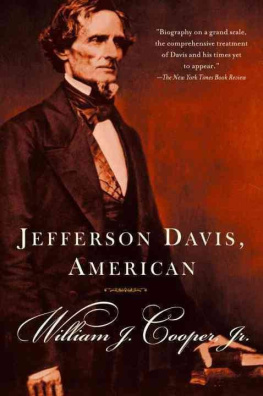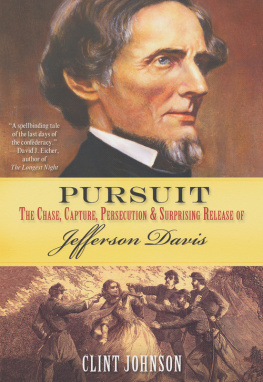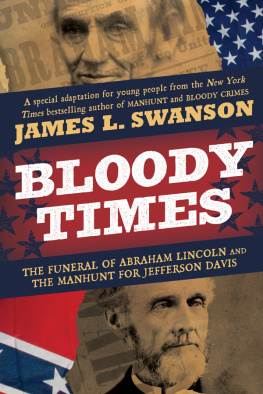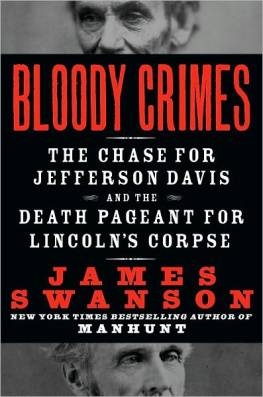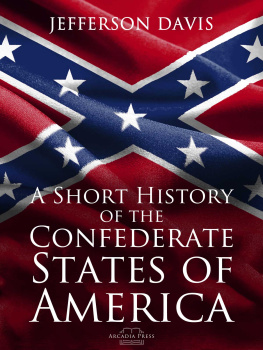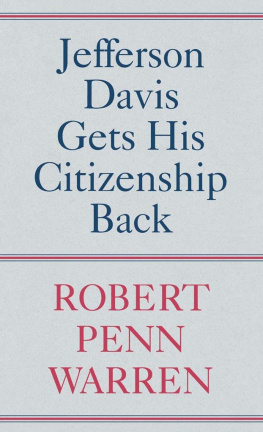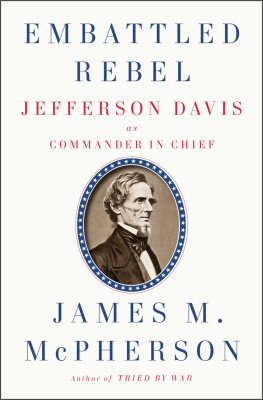ACKNOWLEDGMENTS
During the years I worked on this book, the assistance of many people made possible my journey with Jefferson Davis. My gratitude goes to the many librarians who helped me in discovering the riches they preside over; their number is so large that I must thank them collectively. But I do want to specify two institutions that provided me incredible service over the years. Though not technically a library, the Jefferson Davis Papers housed at Rice University has been absolutely central. Editor Lynda L. Crist and her associates, Mary S. Dix, now retired, and Kenneth H. Williams, gave me free range in their trove of Davis documents. And they willingly responded to unending inquiries. I began and ended this project there. Quite frankly, without their active help I do not think this book would ever have been completed. In addition, past and present staff members of the Museum of the Confederacy in Richmond, particularly its Eleanor S. Brockenbrough Library, were exceedingly generous during my several visits and continuous queries. I am especially grateful to Charity Coman, John Coski, Ruth Ann Coski, Cori Hudgins, and Guy Swanson.
A number of individuals provided indispensable aid in particular instances. Keith Hardison, then superintendent at Beauvoir, hosted a memorable stay at Daviss last home. Michael G. Miller and John Dale IV organized a splendid trip to Davis Island and the sites of Brierfield and Hurricane. Tracking over Daviss Mexican War battlefields would have been much less enjoyable, and in the case of Buena Vista impossible, without the companionship of W. Shelby McKenzie and J. Buford Anderson. In a visit arranged by Guy Swanson, Mrs. Frank G. Strachan welcomed me into her home, the house where Davis died. Writing about a man who suffered from serious illnesses through much of his life, I needed counsel from knowledgeable physicians. And I found themDr. Nicolas G. Bazan, LSU School of Medicine, New Orleans; Dr. Charles S. Bryan, University of South Carolina School of Medicine, Columbia; Dr. Roderick Macdonald, Columbia, South Carolina; Dr. Harris D. Riley, Jr., Childrens Hospital, Vanderbilt University Medical Center, Nashville. All shared their expertise and their insights with me.
Others contributed significantly. A fellowship from the National Endowment for the Humanities enabled me to take a year off to begin my research. My own university generously supported my research and writing. At the outset, R. Jackson Wilson provided invaluable assistance. Ron and Carroll Pohl became innkeepers extraordinaire during an extended stay at the Library of Congress. I found conversations with Joan Cashin, biographer of Varina H. Davis, very beneficial. Throughout the years spent on this book, Catherine Fry both prodded and encouraged me. Her interest in what she always referred to as Mr. Davis never flagged, and she made sure my eye remained fixed on that mark. During the actual writing, my departmental chair, Paul F. Paskoff, was incredibly accommodating to my constant calls on him. Also, in my department, Peggy Seale provided unstinting aid, while Keuren Pinkney, with good spirit, prepared many versions of my manuscript. Over the long course of my work, research assistance came from several graduate students: Bradley Bond, Richard Follett, Christopher Leahy, Robert Outland, John Sacher, and Kevin Yeager. An undergraduate, Justin Poche, helped put the notes in their final form. Mel Rosenthal, amazingly thorough and sensible, expertly guided my book through the production process.
My wife and my editor always stood by me. Patricia Cooper understood how important this book was to me, and she provided support both when things were going well and when they were not. Jane Garrett was patience and encouragement personified. Even when this book began taking much longer than either of us anticipated and completion dates had to be pushed back, she never gave up on me. I greatly value my association with her.
A marvelous attribute of historians is the time they are willing to give to the work of another. Four colleaguesLynda L. Crist, Drew Gilpin Faust, Michael F. Holt, and Charles Roysterread the entire manuscript, and a fifth, Gaines M. Foster, read the postwar chapters. Their critical skills, thoroughness, and candor have made this a much better book than it would have been without their serious attention.
All of the people named in these acknowledgments had a hand in the making of this book. For the help each of them gave, I am enormously grateful. Yet, the book is mine, and I accept full responsibility for it.
W.J.C.
Books by William J. Cooper, Jr.
Jefferson Davis, American
The American South: A History (with Thomas E. Terrill)
Liberty and Slavery: Southern Politics to 1860
The South and the Politics of Slavery, 18281856
The Conservative Regime: South Carolina, 18771890
Editor
Writing the Civil War: The Quest to Understand
(with James M. McPherson)
A Masters Due:
Essays in Honor of David Herbert Donald
(with Michael F. Holt and John M. McCardell, Jr.)
Social Relations in Our Southern States
by Daniel R. Hundley
WILLIAM J. COOPER JR.
William J. Cooper, Jr., is Boyd Professor of History at Louisiana State University. In addition to numerous articles, essays, and reviews, he is the author of The Conservative Regime: South Carolina, 18771890; The South and the Politics of Slavery, 18281856; and Liberty and Slavery: Southern Politics to 1860, as well as coauthor of The American South: A History. He lives in Baton Rouge.
CHAPTER ONE
There My Memories Begin
Jefferson Davis was born on June 3, 1808, in Christian County, Kentucky. Located in the west-central section of the state and bordering Tennessee, Christian County at that time was a sparsely settled part of the western frontier. The infant was named for his fathers political hero, the sitting president of the United States, Thomas Jefferson. His parents also gave him a middle name, which by early manhood he dropped completely; only the initial F. survived. For Samuel Emory Davis in his early fifties and his forty-eight-year-old wife, Jane Cook Davis, this boy, their tenth child, would be their last.
In searching for a home on the American frontier, Samuel Davis followed literally in the steps of his father. Samuels grandfather, the first of this Davis family on this side of the Atlantic Ocean, emigrated from Wales to Philadelphia, perhaps as early as 1701, when a number of Welsh Baptists landed in the Pennsylvania port, and surely before 1720. The place and date of Evan Daviss birth are not known. All genealogical authorities agree on his Welshness, and he was undoubtedly born sometime during the final two decades of the seventeenth century. He had a wife, but only her first name has survived. When and where he and Mary Davis were married is also unknown.
Evan Davis found Philadelphia and Pennsylvania hospitable to his efforts to advance his station and to raise a family. He spent the remainder of his life in the city. The colonys tolerant religious policy permitted him to remain loyal to his Baptist faith. Even though Evan Davis spent most of his working years as a carter, he managed to accumulate enough money to buy property. A deed conveying a city lot to him in 1734 carries the colonys first official notice of him. Although he became a property owner, he never learned to read or write. Neither did his wife. All of his legal documents, including his will, he signed with his mark. Late in life he changed occupations to become an innkeeper. When his will was drawn up in 1743, he identified himself as a carter; but the inventory of his estate prepared after his death in 1747 listed him as an innkeeper. Mary survived him for eleven years, dying in 1758.

